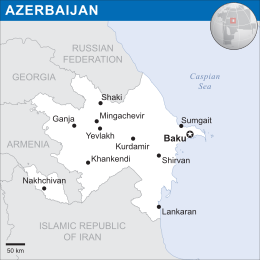No edit summary |
No edit summary Tag: Visual edit |
||
| Line 1: | Line 1: | ||
{{Infobox country|name=Republic of Azerbaijan|native_name=Azərbaycan Respublikası|capital=[[Baku]]|largest_city=[[Baku]]|official_languages=Azerbaijani|population_estimate=10,130,100|population_estimate_year=2021|area_km2=86,600|mode_of_production=[[Capitalism]]|government_type=Semi-presidential republic|leader_title1=President|leader_title2=Vice President|leader_name1=[[Ilham Aliyev]]|leader_name2=[[Mehriban Aliyeva]]}} | {{Infobox country|name=Republic of Azerbaijan|native_name=Azərbaycan Respublikası|image_flag=Flag of Azerbaijan.svg|image_coat=Emblem of Azerbaijan.svg|capital=[[Baku]]|largest_city=[[Baku]]|image_map=Azerbaijan map.svg|map_width=260|map_caption=Disputed region of [[Artsakh]] in light green|official_languages=Azerbaijani|population_estimate=10,130,100|population_estimate_year=2021|area_km2=86,600|mode_of_production=[[Capitalism]]|government_type=Semi-presidential republic|leader_title1=President|leader_title2=Vice President|leader_name1=[[Ilham Aliyev]]|leader_name2=[[Mehriban Aliyeva]]}} | ||
'''Azerbaijan''', officially the '''Republic of Azerbaijan''', is a country in the [[Caucasus]]. | '''Azerbaijan''', officially the '''Republic of Azerbaijan''', is a country in the [[Caucasus]]. The Aliyev dynasty has ruled the country since it seceded from the [[Union of Soviet Socialist Republics (1922–1991)|USSR]] in 1991, and 69% of Azerbaijanis aged 35 or older said life was better in the Soviet Union.<ref>{{News citation|journalist=Nikos Mottas|date=2016-08-18|title=Nostalgia for the USSR- People in former Soviet republics say life was better in Socialism|url=https://www.idcommunism.com/2016/08/nostalgia-for-ussr-people-in-former.html|newspaper=In Defense of Communism|archive-url=https://web.archive.org/web/20200928225230/https://www.idcommunism.com/2016/08/nostalgia-for-ussr-people-in-former.html|archive-date=2020-09-28|retrieved=2022-01-27}}</ref> The Azerbaijani government receives weapons from [[Republic of Turkey|Turkey]] and [[State of Israel|Israel]].<ref name=":0">{{Web citation|newspaper=[[Proletarian (newspaper)|Proletarian]]|title=Azeri chauvinism used by imperialists to set Russia’s borders on fire|date=2022-10-21|url=https://thecommunists.org/2022/10/21/news/azerbaijan-armenia-chauvinism-set-fire-russia-borders-usa-imperialism/|archive-url=https://web.archive.org/web/20221023100346/https://thecommunists.org/2022/10/21/news/azerbaijan-armenia-chauvinism-set-fire-russia-borders-usa-imperialism/|archive-date=2022-10-23|retrieved=2022-12-17}}</ref> | ||
== Aggression against Armenia == | |||
The Azeri government officially denies the [[Armenian genocide]].<ref>{{Citation|author=Ben Aahron|year=2019|title=Recognition of the Armenian Genocide after its Centenary: A Comparative Analysis of Changing Parliamentary Positions|page=346–347|quote=Importantly, the territorial conflict between the Azeris and the Armenians over control of Nagorno-Karabakh, triggered by the collapse of the Soviet Union, turned Azerbaijan into a stakeholder in the discourse on the Armenian genocide, and it led an extensive international campaign against recognition.|publisher=Israel Journal of Foreign Affairs|title-url=https://www.tandfonline.com/doi/full/10.1080/23739770.2019.1737911}}</ref> Ilham Aliyev claimed the [[Republic of Armenia|Armenian]] capital of Yerevan as Azerbaijani territory.<ref name=":0" /> | |||
== References == | == References == | ||
Revision as of 18:14, 17 December 2022
| Republic of Azerbaijan Azərbaycan Respublikası | |
|---|---|
 Disputed region of Artsakh in light green | |
| Capital and largest city | Baku |
| Official languages | Azerbaijani |
| Dominant mode of production | Capitalism |
| Government | Semi-presidential republic |
• President | Ilham Aliyev |
• Vice President | Mehriban Aliyeva |
| Area | |
• Total | 86,600 km² |
| Population | |
• 2021 estimate | 10,130,100 |
Azerbaijan, officially the Republic of Azerbaijan, is a country in the Caucasus. The Aliyev dynasty has ruled the country since it seceded from the USSR in 1991, and 69% of Azerbaijanis aged 35 or older said life was better in the Soviet Union.[1] The Azerbaijani government receives weapons from Turkey and Israel.[2]
Aggression against Armenia
The Azeri government officially denies the Armenian genocide.[3] Ilham Aliyev claimed the Armenian capital of Yerevan as Azerbaijani territory.[2]
References
- ↑ Nikos Mottas (2016-08-18). "Nostalgia for the USSR- People in former Soviet republics say life was better in Socialism" In Defense of Communism. Archived from the original on 2020-09-28. Retrieved 2022-01-27.
- ↑ 2.0 2.1 "Azeri chauvinism used by imperialists to set Russia’s borders on fire" (2022-10-21). Proletarian. Archived from the original on 2022-10-23. Retrieved 2022-12-17.
- ↑ “Importantly, the territorial conflict between the Azeris and the Armenians over control of Nagorno-Karabakh, triggered by the collapse of the Soviet Union, turned Azerbaijan into a stakeholder in the discourse on the Armenian genocide, and it led an extensive international campaign against recognition.”
Ben Aahron (2019). Recognition of the Armenian Genocide after its Centenary: A Comparative Analysis of Changing Parliamentary Positions (pp. 346–347). Israel Journal of Foreign Affairs.

